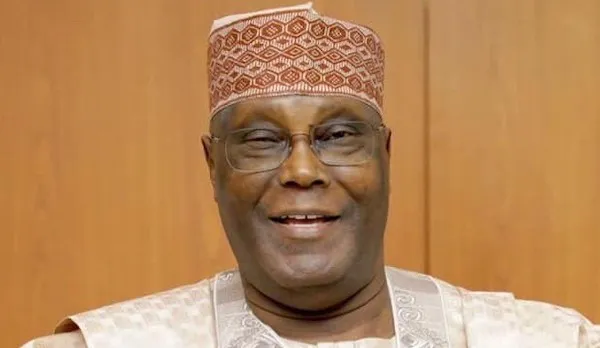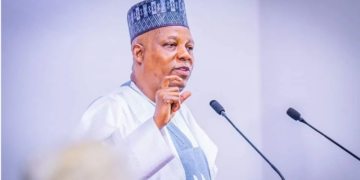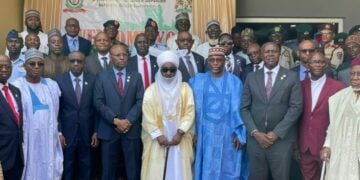In a scathing rebuke, the presidency has accused former Vice President Atiku Abubakar of prioritising criticism of President Bola Tinubu administration over addressing internal challenges within his own political party, suggesting the opposition leader remains bitter about his sixth unsuccessful presidential bid.
Special Adviser to the President on Information & Strategy, Bayo Onanuga, in a statement released on Sunday, suggested that Atiku’s persistent criticism stemmed from envy of Tinubu’s position.
“Since his defeat in the last election, former Vice President Atiku Abubakar has shown more interest in undermining President Bola Ahmed Tinubu than in addressing his party’s implosion,” Onanuga stated.
The presidency particularly took issue with Atiku’s recent economic critique titled “What We Would Have Done Differently,” dismissing it as an “untested, hypothetical proposal” that had already been rejected by Nigerians during the 2023 Presidential Election.
The statement characterised Atiku’s economic analysis as demonstrating “a significant misunderstanding of Nigeria’s realities.”
Addressing Atiku’s claims of a “stolen presidency,” Onanuga attributed the former vice president’s electoral loss to his “arrogance, insensitivity to Nigeria’s diversity, and the decision to disregard his party’s power rotation arrangement between the North and the South after eight years of President Muhammadu Buhari.”
The presidential spokesman highlighted the stark economic challenges inherited by the Tinubu administration, including what it described as “exorbitant subsidy expenditures far exceeding government earnings from crude oil.”
According to the presidency, by mid-2023, fuel was being sold at an average of N200 while the landing cost was between N500 and N600, with the 2023 budget allocating N3.36 trillion for fuel subsidies against a projected N2.23 trillion in oil revenue.
Defending the administration’s reforms, Onanuga pointed to significant achievements, including nearly doubled revenue generation by the Federal Inland Revenue Service in the first half of 2024.
He also highlighted that states of the Federation have increased minimum wages to between N70,000 and N85,000, attributing the development to improved revenue sharing.
According to him, “Atiku’s critiques of Tinubu’s presidency are mere harebrained propositions devoid of realistic alternatives. He must reckon with the decades of mismanaged economy inherited by the current administration, including exorbitant subsidy expenditures far exceeding government earnings from crude oil.
“As of mid-2023, the landing cost of fuel was between N500 and N600, while it was sold nationwide at an average of N200. The 2023 budget allocated N3.36 trillion for fuel subsidies until June 2023 against a projected N2.23 trillion in oil revenue for the year. The Nigerian state was on life support.
“Instead of conjuring imaginary scenarios, we expect the former vice president to engage with these urgent realities.
“The estimated N5.4 trillion savings from subsidy removal in 2024 are being actively directed toward infrastructure development and social intervention programmes, initiatives that will benefit all tiers of government and enhance Nigerians’ quality of life.
“We expect Atiku to commend what the Tinubu administration has done concerning revenue generation for the Federation. Without factoring in oil sales, revenue proceeds generated by the Federal Inland Revenue Service almost doubled in the first half of 2024, compared with the level Tinubu met in 2023.
“The states and councils are more prosperous because of it, as many states have increased the minimum wage for their workers to between N70,000 and N85,000.
The presidency particularly criticized Atiku’s privatization proposals for the nation’s refineries, referencing historical context from 2007 when investors offered what was considered “scrap value” for major refineries.
“As vice president, Atiku oversaw the sale of the nation’s assets to private individuals and cronies at low prices. Today, most public enterprises Atiku sold have been stripped and become dead assets,” Onanuga noted.
In a particularly sharp critique, the presidency questioned Atiku’s credibility to discuss corruption, referencing historical allegations involving his wife and his former business associate, U.S. Congressman William Jefferson, who was jailed for 13 years.
Onanuga defended President Tinubu’s approach to subsidy removal and foreign exchange management, dismissing Atiku’s proposed “managed float” system as a “dirty float.”
He said “in his foreign exchange management proposal, Atiku declared that a fixed exchange rate system was out of the question. Yet his managed float proposal, another gradualist approach, is still the same as the old fixed exchange rate system, which stagnated the national economy by subsidising forex up to $1.5 billion monthly to a privileged few.
“Atiku should remember that a managed float is also known as a dirty float because of its inherent flaws. The system combines elements of fixed and floating exchange rates. The CBN will still have to set the exchange rate and make it available to people and businesses. Access is not guaranteed to all, as it is now. “
It highlighted the administration’s social intervention programs, including cash transfers targeting 20 million Nigerians, student loans, consumer credits, and the Presidential CNG Initiative.
Onanuga advised Atiku to “abandon his politics of distraction and fantasies and focus on constructive discourse,” emphasising that President Tinubu remained focused on addressing the nation’s real challenges.





